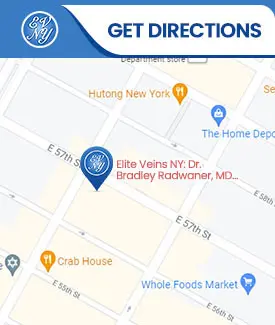By using our website, you agree to the use of cookies as described in our Cookie Policy
What Are the Symptoms of Venous Insufficiency?
If you believe you are developing venous insufficiency symptoms, come to Elite Veins NY for a check-up and comprehensive treatment. For more information, call us or book an online appointment. We serve patients from New York City, NY and surrounding areas.


Table of Contents:
Venous insufficiency is a condition in which the veins that carry blood from the legs back to the heart are narrower than normal, which can limit the amount of blood that flows through them. These veins supply blood to the heart, so when they are narrower than usual, it can result in certain vascular problems. There are a number of safe and effective treatments for venous insufficiency, which can provide propitious prognoses when provided by a qualified medical professional.
What are the symptoms of Venous Insufficiency?
Symptoms of venous insufficiency include:
– Swelling of the legs or ankles (edema)
– Pain that gets worse when standing and improves when elevating legs
– Leg cramps
– Aching, throbbing
– A feeling of heaviness in the legs
– Itchy legs
– Weak legs
– Thickening of leg or ankle skin
– Skin that is changing color, particularly the ankle area
– Leg ulcers
– Varicose veins
– A feeling of tightness in the calves
How do I know I have venous insufficiency?
When the veins cannot properly send blood from the limbs to the heart, venous insufficiency is diagnosed. This causes blood to pool in the legs, leading to both visual signs and physical symptoms. These may include:
– Swelling — Often the first sign that people notice when they have venous insufficiency is swelling. This is most likely to occur in the ankles and lower legs, particularly after standing for a prolonged period of time.
– Pain That Gets Better When Legs Are Elevated — When suffering from venous insufficiency, many people also experience leg pain. This pain generally feels worse upon standing and then gets much better when raising the legs; this is due to the effects of gravity, which can make it harder for blood to circulate.
– Varicose Veins — Yet another symptom of venous insufficiency is varicose veins. The pooling blood puts stress on the veins, causing them to bulge and become visible through the surface of the skin. The problem can get much worse without medical intervention, so it is imperative to seek professional help right away.
– Red and Itchy Legs — The excess blood puts so much pressure on the veins that they eventually leak, leading to inflammation in the walls of the veins and the surrounding skin. The skin will become itchy and red due to a condition known as venous stasis dermatitis.
– Darkening of the Skin — Leaking blood vessels can also cause the overlying skin to darken, which may take on the appearance of a bruise. This is most likely to occur close to the ankles, but can also occur on the calves and thighs. Known as hyperpigmentation, this darkening is the result of a breakdown of leaky blood cells underlying the skin.
– Thickening Skin — In addition to changes in the skin’s color, the dermis may actually become thicker from venous insufficiency. Thickened skin typically has a leathery feel; adjacent areas are also darkened to a brownish color. This represents later stages of vein disease.
– Wounds That Will Not Heal — Another characteristic of venous insufficiency is slower wound healing. Venous stasis ulcers may start to develop if the breakdown of the skin is caused by underlying varicose veins. These ulcers will be slow to heal and may be permanent if left untreated, so it is imperative to seek immediate care.
Why do my legs feel tight and itchy?
Tightness in the legs is the feeling that comes from venous congestion, the inability of the vascular system to return the blood back to the heart from the legs. Tightness is a sign that pressure is accumulating, most likely from blood in the veins that pool in the leg. This can cause the skin on the legs to feel itchy, which can be persistent.
Why do I have pain while walking but not at rest?
There are a wide number of conditions that can cause pain while walking but not while at rest. Most of the conditions associated with this symptom are related to the nervous system or vascular system. Venous insufficiency is one of the most common causes of this specific type of pain, and should be addressed by a medical professional at the earliest opportunity.
If you are experiencing the symptoms of venous insufficiency, trust the vein specialists at Elite Veins NY. Call us today to book an appointment with our venous insufficiency treatment specialist, or visit our practice conveniently located at 136 East 57th Street, Suite 1001, New York, NY 10022. We serve patients from the New York City NY, Queens NY, Brooklyn NY, Manhattan NY, Bronx NY, Hoboken NJ, West New York NJ and surrounding areas.


